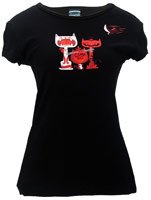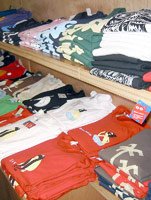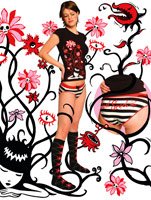Rising Sum: Anime-Inspired Graphics Fuel Specialty Lines
“Character driven” is a term usually bandied about in Hollywood, but at Cosmic Debris it also describes a growing apparel line. Emily the Strange, Oopsy Daisy, Yum Pop and Bon Bon are the heroes of this Oakland, Calif.–based company’s story, whose visuals borrow from Japanese animation and whose plot has thickened to a 10 percent increase in sales this year.
Founded in 1992 in the garage of creative director Rob Reger, Cosmic Debris has grown steadily through the rising popularity of Japanese pop culture—anime, manga (comic books) and collectible toy figurines—to a company grossing several million in annual sales.
Cosmic Debris produces four labels, of which Emily the Strange is the largest, based on Tshirts and accessories with iconic characters. “The Japanese have characters that represent everything from a sewage plant to a candy bar,” said Reger. “They can bring life to any inanimate object.”
Each T-shirt shows a character in a new situation that develops in the eyes of the consumer. Tees wholesale for $8 to $15, and the Emily Strange label is a full apparel line including funky dresses and outerwear that top out at $75. Cosmic Debris targets women aged 13 to 30 and sells in retail channels ranging from Hot Topic to Kohl’s.
Emily the Strange has expanded her world beyond the confines of a cotton T-shirt. Her third graphic novel is slated for a Spring 2005 release by Chronicle Books. Cosmic Debris has recently put the Bon Bon character on the international licensing market.
Art and commerce
Anime-influenced T-shirt graphics are prized for having legitimate artistic value, says retailer Madeline Yang of Pasadena, Calif.’s Red Dress Shoppe. “It’s seen as illustration, which is a form of art, and as a way to merchandise art,” she said. Yang carries several lines with Asian pop graphics, including some that feature retro robots appealing to male skateboarder and tech-geek customers. She credits Costa Mesa, Calif.–based Paul Frank Industries with popularizing illustrated characters on apparel in the United States.
Yang’s top line is San Francisco– based Gama-Go (an arbitrary made-up name). Chris Edmundson founded the line three-and-a-half years ago, driven by his love for Japanese pop culture. Gama-Go’s T-shirts and accessories are designed by four artists. “We come from an art background, but art and fashion go hand in hand,” said Edmundson. The company projects $800,000 in sales this year.
Lead artist Tim Biskup has a strong following among galleries and collectors, and his designs draw inspiration from sources such as the ’60s Japanese TV show “Ultraman.” Gama-Go produces runs of only 250 per T-shirt design, but cranks out 80 designs per year. Tees wholesale for $11, with outerwear fetching $34.
Edmundson says Japanese pop is a rapidly growing subculture poised to go mainstream. He calls Kid Robot, a retailer of pricey Japanese toys with stores in New York and San Francisco, “hugely successful,” and notes a “huge growth in Japanese animation.”
At the MAGIC International trade show in Las Vegas in August, Gama-Go will unveil a new line of athletic shoes. Although the shoes will have characters on them, “It’s going to be something that’s wearable,” says Edmundson. “We don’t want to make something that’s completely character-driven and looks like a clown shoe.”
From magazines to merchandise
A pioneer in the appreciation of J-pop is Giant Robot, a magazine founded 10 years ago by Eric Nakamura. The company branched into retail and now includes two retail stores on Sawtelle Boulevard in West Los Angeles. Both stores feature extensive T-shirt collections with graphics by serious artists, such as Toshitomo Nara, whose paintings can fetch $60,000. Artist Takashi Murakami also blended Japanese pop art and fashion when he designed Louis Vuitton’s coveted Murakami handbag. Previously Murakami had licensed his art on T-shirts, but his Vuitton contract now forbids it outside Japan, says Nakamura.
Half of Giant Robot’s T-shirt buyers are collecting the work of a specific artist, while the other half simply admires the graphic. The store’s clientele runs the gamut of ethnicities and is mostly aged 18 to 35. Many work in the design field, notes Nakamura.
Giant Robot also carries tees by Japan’s 2K, Los Angeles–based Braveland Design and San Francisco’s J.otto and KALIFORNIAREPUBLIK.
Many of the lines’ founders share a fascination with Japanese toys of the 1970s, which had high-concept, tech-savvy designs and amazing attention to detail. “There was nothing like that here,” says Nakamura. “Japan had the best.”
























